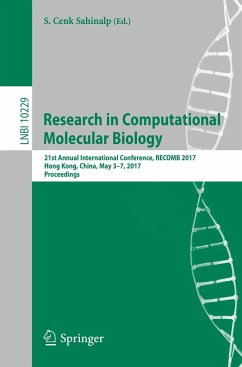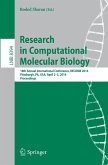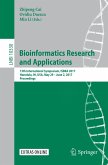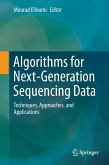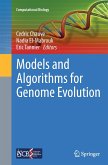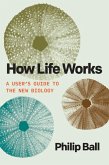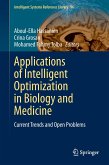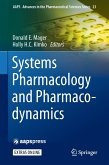Research in Computational Molecular Biology
21st Annual International Conference, RECOMB 2017, Hong Kong, China, May 3-7, 2017, Proceedings
Herausgegeben:Sahinalp, S. Cenk
Research in Computational Molecular Biology
21st Annual International Conference, RECOMB 2017, Hong Kong, China, May 3-7, 2017, Proceedings
Herausgegeben:Sahinalp, S. Cenk
- Broschiertes Buch
- Merkliste
- Auf die Merkliste
- Bewerten Bewerten
- Teilen
- Produkt teilen
- Produkterinnerung
- Produkterinnerung
This book constitutes the proceedings of the 21th Annual Conference on Research in Computational Molecular Biology, RECOMB 2017, held in Hong Kong, China, in May 2017. The 22 regular papers presented in this volume were carefully reviewed and selected from 184 submissions. 16 short abstracts are included in the back matter of the volume. They report on original research in all areas of computational molecular biology and bioinformatics
Andere Kunden interessierten sich auch für
![Research in Computational Molecular Biology Research in Computational Molecular Biology]() Research in Computational Molecular Biology39,99 €
Research in Computational Molecular Biology39,99 €![Bioinformatics Research and Applications Bioinformatics Research and Applications]() Bioinformatics Research and Applications54,99 €
Bioinformatics Research and Applications54,99 €![Algorithms for Next-Generation Sequencing Data Algorithms for Next-Generation Sequencing Data]() Algorithms for Next-Generation Sequencing Data100,99 €
Algorithms for Next-Generation Sequencing Data100,99 €![Models and Algorithms for Genome Evolution Models and Algorithms for Genome Evolution]() Models and Algorithms for Genome Evolution77,99 €
Models and Algorithms for Genome Evolution77,99 €![How Life Works How Life Works]() Philip BallHow Life Works25,99 €
Philip BallHow Life Works25,99 €![Applications of Intelligent Optimization in Biology and Medicine Applications of Intelligent Optimization in Biology and Medicine]() Applications of Intelligent Optimization in Biology and Medicine39,99 €
Applications of Intelligent Optimization in Biology and Medicine39,99 €![Systems Pharmacology and Pharmacodynamics Systems Pharmacology and Pharmacodynamics]() Systems Pharmacology and Pharmacodynamics193,99 €
Systems Pharmacology and Pharmacodynamics193,99 €-
-
-
This book constitutes the proceedings of the 21th Annual Conference on Research in Computational Molecular Biology, RECOMB 2017, held in Hong Kong, China, in May 2017.
The 22 regular papers presented in this volume were carefully reviewed and selected from 184 submissions. 16 short abstracts are included in the back matter of the volume. They report on original research in all areas of computational molecular biology and bioinformatics
The 22 regular papers presented in this volume were carefully reviewed and selected from 184 submissions. 16 short abstracts are included in the back matter of the volume. They report on original research in all areas of computational molecular biology and bioinformatics
Produktdetails
- Produktdetails
- Lecture Notes in Computer Science 10229
- Verlag: Springer / Springer International Publishing / Springer, Berlin
- Artikelnr. des Verlages: 978-3-319-56969-7
- 1st ed. 2017
- Seitenzahl: 420
- Erscheinungstermin: 12. April 2017
- Englisch
- Abmessung: 235mm x 155mm x 23mm
- Gewicht: 666g
- ISBN-13: 9783319569697
- ISBN-10: 3319569694
- Artikelnr.: 47805519
- Herstellerkennzeichnung Die Herstellerinformationen sind derzeit nicht verfügbar.
- Lecture Notes in Computer Science 10229
- Verlag: Springer / Springer International Publishing / Springer, Berlin
- Artikelnr. des Verlages: 978-3-319-56969-7
- 1st ed. 2017
- Seitenzahl: 420
- Erscheinungstermin: 12. April 2017
- Englisch
- Abmessung: 235mm x 155mm x 23mm
- Gewicht: 666g
- ISBN-13: 9783319569697
- ISBN-10: 3319569694
- Artikelnr.: 47805519
- Herstellerkennzeichnung Die Herstellerinformationen sind derzeit nicht verfügbar.
Boosting alignment accuracy by adaptive local realignment.- A concurrent subtractive assembly approach for identification of disease associated sub-meta-genomes.- A flow procedure for the linearization of genome variation graphs.- Dynamic alignment-free and reference-free read compression.- A fast approximate algorithm for mapping long reads to large reference databases.- Determining the consistency of resolved triplets and fan triplets.- Progressive calibration and averaging for tandem mass spectrometry statistical confidence estimation: Why settle for a single decoy.- Resolving multi-copy duplications de novo using polyploid phasing.- A Bayesian active learning experimental design for inferring signaling networks.- BBK* (Branch and Bound over K*): A provable and efficient ensemble-based algorithm to optimize stability and binding affinity over large sequence spaces.- Super-bubbles, ultra-bubbles and cacti.- EPR-dictionaries: A practical and fast data structure for constant time searches in unidirectional and bidirectional FM indices.- A Bayesian framework for estimating cell type composition from DNA methylation without the need for methylation reference.- Towards recovering Allele-specific cancer genome graphs.- Using stochastic approximation techniques to efficiently construct confidence intervals for heritability.- Improved search of large transcriptomic sequencing databases using split sequence bloom trees.- All some sequence bloom trees.- Longitudinal genotype-phenotype association study via temporal structure auto-learning predictive model.- Improving imputation accuracy by inferring causal variants in genetic studies.- The copy-number tree mixture deconvolution problem and applications to multi-sample bulk sequencing tumor data.- Quantifying the impact of non-coding variants on transcription factor-DNA binding.- aBayesQR: A Bayesian method for reconstruction of viral populations characterized by low diversity.- BeWith: A between-within method for module discovery in cancer using integrated analysis of mutual exclusivity, co-occurrence and functional interactions.- K-mer Set Memory (KSM) motif representation enables accurate prediction of the impact of regulatory variants.- Network-based coverage of mutational profiles reveals cancer genes.- Ultra-accurate complex disorder prediction: case study of neurodevelopmental disorders.- Inference of the human polyadenylation Code.- Folding membrane proteins by deep transfer learning.- A network integration approach for drug-target interaction prediction and computational drug repositioning from heterogeneous information.- Epistasis in genomic and survival data of cancer patients.- Ultra-fast identity by descent detection in biobank-scale cohorts using positional burrows-wheeler transform.- Joker de Bruijn: sequence libraries to cover all k-mers using joker characters.- GATTACA: Lightweight metagenomic binning using kmer counting.- Species tree estimation using ASTRAL: how many genes are enough.-Reconstructing antibody repertoires from error-prone immune-sequencing datasets.- NetREX: Network rewiring using EXpression - Towards context specific regulatory networks.- E pluribus unum: United States of single cells.- ROSE: a deep learning based framework for predicting ribosome stalling.
Boosting alignment accuracy by adaptive local realignment.- A concurrent subtractive assembly approach for identification of disease associated sub-meta-genomes.- A flow procedure for the linearization of genome variation graphs.- Dynamic alignment-free and reference-free read compression.- A fast approximate algorithm for mapping long reads to large reference databases.- Determining the consistency of resolved triplets and fan triplets.- Progressive calibration and averaging for tandem mass spectrometry statistical confidence estimation: Why settle for a single decoy.- Resolving multi-copy duplications de novo using polyploid phasing.- A Bayesian active learning experimental design for inferring signaling networks.- BBK* (Branch and Bound over K*): A provable and efficient ensemble-based algorithm to optimize stability and binding affinity over large sequence spaces.- Super-bubbles, ultra-bubbles and cacti.- EPR-dictionaries: A practical and fast data structure for constant time searches in unidirectional and bidirectional FM indices.- A Bayesian framework for estimating cell type composition from DNA methylation without the need for methylation reference.- Towards recovering Allele-specific cancer genome graphs.- Using stochastic approximation techniques to efficiently construct confidence intervals for heritability.- Improved search of large transcriptomic sequencing databases using split sequence bloom trees.- All some sequence bloom trees.- Longitudinal genotype-phenotype association study via temporal structure auto-learning predictive model.- Improving imputation accuracy by inferring causal variants in genetic studies.- The copy-number tree mixture deconvolution problem and applications to multi-sample bulk sequencing tumor data.- Quantifying the impact of non-coding variants on transcription factor-DNA binding.- aBayesQR: A Bayesian method for reconstruction of viral populations characterized by low diversity.- BeWith: A between-within method for module discovery in cancer using integrated analysis of mutual exclusivity, co-occurrence and functional interactions.- K-mer Set Memory (KSM) motif representation enables accurate prediction of the impact of regulatory variants.- Network-based coverage of mutational profiles reveals cancer genes.- Ultra-accurate complex disorder prediction: case study of neurodevelopmental disorders.- Inference of the human polyadenylation Code.- Folding membrane proteins by deep transfer learning.- A network integration approach for drug-target interaction prediction and computational drug repositioning from heterogeneous information.- Epistasis in genomic and survival data of cancer patients.- Ultra-fast identity by descent detection in biobank-scale cohorts using positional burrows-wheeler transform.- Joker de Bruijn: sequence libraries to cover all k-mers using joker characters.- GATTACA: Lightweight metagenomic binning using kmer counting.- Species tree estimation using ASTRAL: how many genes are enough.-Reconstructing antibody repertoires from error-prone immune-sequencing datasets.- NetREX: Network rewiring using EXpression - Towards context specific regulatory networks.- E pluribus unum: United States of single cells.- ROSE: a deep learning based framework for predicting ribosome stalling.

